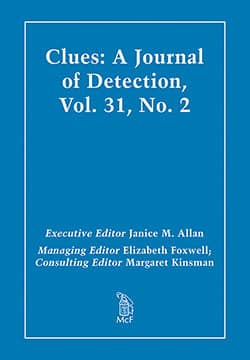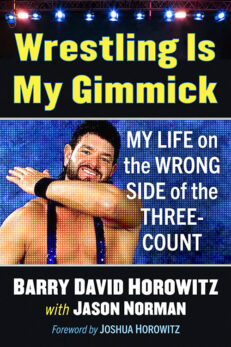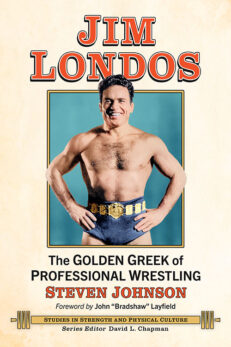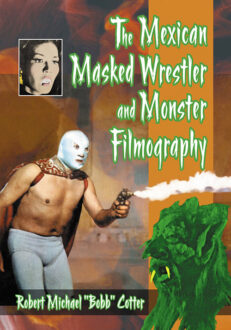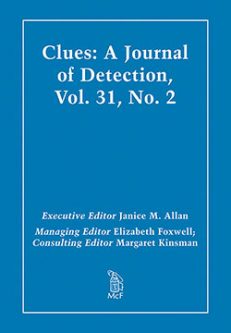Clues: A Journal of Detection, Vol. 31, No. 2 (Fall 2013)
Print Back Issue$30.00
In stock
About the Book
BACK ISSUE
This is a single back issue only. To order a current subscription, or for more information, please visit the journal’s web page at CluesJournal.com. Back issues from earlier volumes of Clues are available for order subject to availability. Also, single issues of the current volume may be ordered one at a time. Individuals may order back issues directly from our online catalog, and the charge for individuals is $30 (excluding postage). Issues from Volume 33 to the present are also available in ebook format on Kindle, Nook and Google Play.
The charge for single issues for institutions is $75 per issue (excluding postage). If your institution requires a back issue, please contact us to order at the appropriate rate.
About the Author(s)
Bibliographic Details
Executive Editor Janice M. Allan
Managing Editor Elizabeth Foxwell
Consulting Editor Margaret Kinsman
Format: softcover (7 x 10), back issue
Pages: 144
Bibliographic Info:
Copyright Date: 2013
ISSN 0742-4248
Imprint: McFarland
Table of Contents
Introduction: Journeys through Crime, Time, and Space
Janice M. Allan 5
From Enigmas to Emotions: The Twentieth-Century Canonization of
Crime Fiction
Maurizio Ascari 9
Starting from the early–twentieth-century criticism of the “clue-puzzle” tradition, the author investigates the progressive return of emotions to the scene of both creative and critical crime writing. The analysis encompasses aspects of the twentieth-century canonization of crime fiction, dispelling some lingering critical prejudices and presenting the genre as complex.
Enlightenment, Counter-Enlightenment: Detection, Reason, and Genius in Tales of Edgar Allan Poe and Arthur Conan Doyle
Greg Sevik 20
The author explores the complex relationship between detective fiction and traditions of the Enlightenment and Counter-Enlightenment, including romanticism. Given this background, he argues that detective stories by Edgar Allan Poe and Arthur Conan Doyle highlight the productive tension within Western reason among rule-bound rationality, critical reflection, and the inexplicability of genius.
True Crime in Bermondsey: Representations of Maria Manning
Anna Kay 32
The author examines the literary representations of the nineteenth-century murderess Maria Manning, arguing that the frequently complex and contradictory images that emerged of Manning illuminate broader insights into Victorian conceptions of gender, sexuality, and criminality.
Wilkie Collins’s The Law and the Lady and Feminine Reason: “Quite incredible, and nevertheless quite true!”
Tabitha Sparks 46
The author examines Collins’s 1875 detective novel The Law and the Lady as a site of conflict between institutional, legal power and feminine resistance to it, with a disabled character upsetting the rigid gender and social norms that underwrite the novel’s central mystery.
“What we call civilization”: Raymond Chandler’s Geographic Critique
of Socioeconomic Inequalities in the Philip Marlowe Novels—A Barthesian Reading
Peter Chomko 56
In his Philip Marlowe novels, Raymond Chandler subverts the formulaic narrative structure common to much mainstream crime fiction and, in doing so, opens up to the popular imagination new ways of deconstructing many mid-century myths about Los Angeles. Unlike the fictional detectives who preceded him, Marlowe does not solve crimes so much as expose them, bringing to light the corrupt superstructure of inequality and injustice that shapes—and
is shaped by—the Los Angeles landscape.
Liminality and Patricia Highsmith’s The Talented Mr. Ripley
Peter Messent 67
The author examines Patricia Highsmith’s The Talented Mr. Ripley to illustrate the role of liminality in her text. Highsmith explores the relationship among violent crime, deception, and the free-floating nature of subjectivity to foreground the ability to move between selves. Such transitions destabilize any notion of the grounded self and, moreover, radically challenge the understanding of the meaning of civilization and culture.
Literary Allusions in Robert B. Parker’s Spenser Series
Marty S. Knepper 78
Although Robert B. Parker and his private-eye hero Spenser had no great love of academics, they both loved reading. The first-person narrative and dialogue in
the Spenser series “display a broad range of literary references, serving various artistic purposes and giving pleasure to book-loving readers.
Masochism and the Novela Negra: The Case of Francisco González Ledesma
Shelley Godsland 90
The author argues that Spain’s novella negra exposes and explores the masochism of its tough male investigator, as did its predecessor, the American hard-boiled detective. In Expediente Barcelona (1983) by Francisco González Ledesma, the protagonist’s masochistic attitudes and behaviors are illuminated through discussion of Freudian and other thinking on masochism.
“There’s nothing people won’t do to one another, if the circumstances are right”: Male Rape and the Politics of Representation in John Harvey’s Police Procedural Easy Meat
Charlotte Beyer 102
The author discusses portrayals of male rape in John Harvey’s police procedural novel Easy Meat (1996), exploring how the novel interrogates the representation of sexual crime, male rape, and masculinity in crime fiction. By examining Harvey’s portrayal of masculinity and sexuality in Easy Meat, the author explores the ways in which crime fiction problematizes the politics of representing sexual crime.
Crime Fiction and the Armchair Traveler: The Case of Martin Walker’s Bruno
Courrèges Series
John Scaggs 112
The defining characteristic of Martin Walker’s Bruno Courrèges novels is their detailed sense of place. The author examines how the sense of place is created in the novels and suggests that, rather than merely being a simple backdrop against which the plots of the novels unfold, it is an integral part of their themes and narrative structures.
“You Think It’s Possible to Fix Broken Things?”: Terror in the South African Crime Fiction of Margie Orford and Jassy Mackenzie
Marla Harris 122
Drawing on the work of Robert J. C. Young, the author argues that Jassy Mackenzie and Margie Orford’s crime novels of post-apartheid South Africa offer coping strategies in the face of inexplicable violence. As they fundamentally are about living with terror and terrorism, they resonate with contemporary American readers.
BOOK REVIEWS
Saturo Saito. Detective Fiction and the Rise of the Japanese Novel, 1880–1930. Elizabeth Blakesley 132
Michael Dirda. On Conan Doyle: Or, The Whole Art of Storytelling. Natalie Hevener Kaufman 133
Melissa Schaub. Middlebrow Feminism in Classic British Detective Fiction: The Female Gentleman. Rosemary Erickson Johnsen 135
Peter Baker and Deborah Shaller, eds. Detecting Detection: International Perspectives on the Uses of a Plot. Mimosa Summers Stephenson 137
Index 140
Author Guidelines are on page 144
Book Reviews & Awards
- “Clues is a must-have for readers and writers of crime fiction. Scholarly, thought-provoking, wide-ranging in its topics, Clues covers the crime and thriller map.”—Sara Paretsky
- “A. Conan Doyle, notoriously resentful of Sherlock Holmes’s success, liked to scorn ‘police romances’ as less significant and worthy of his talents than his other literary work. If he could have read Clues, the thinking mystery reader’s journal, he would surely have felt differently—and learned much he never realized himself about even his own landmark contribution to the genre, from which so much else by others has flowed.”—Jon Lellenberg, U.S. agent for the Arthur Conan Doyle estate
- “I love reading Clues. Every issue provides thought-provoking, well-researched articles. The variety and scope of the material found in Clues makes an unparalleled, ongoing contribution to our understanding of the role of crime fiction in our culture, and the genre’s reflection of its time and society.”—Jan Burke, Edgar-winning author of The Messenger (2009)
- “Clues is an important journal. It carries the torch of tradition that is the backbone of detective fiction. It goes below the surface and gets to the heart of what makes the genre so fascinating and valid today”—Michael Connelly, author of the Harry Bosch novels, including The Overlook (2007)
- “for erudite and fascinating truths about mysteries, follow the clues to Clues, the scholarly journal that is an essential resource for every serious student of the mystery”—Carolyn Hart, author of Death Walked In (2008)
- “with scholarship ranging from Poe to Peters, nothing beats Clues”—Joan Hess, author of Mummy Dearest (2008).

